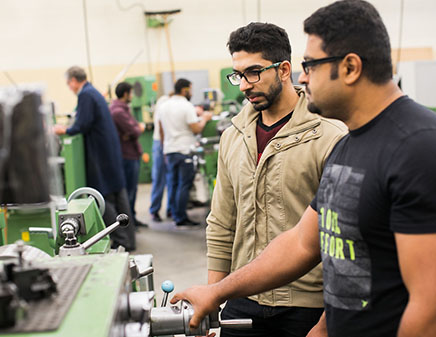
Mechanical Engineering Technology
Salaries in Utah
Annual Median Salary: $64,930*
*utahfuture.org
Annual median salaries noted are Utah-wide. Salaries vary depending on the region, workplace and skill level.

What you will learn
- Learn classic approaches to problem solving. Fundamental techniques based in science and mathematics are emphasized in engineering analysis.
- Learn to use high-technology software tools. Cutting-edge computer-aided design (CAD) and finite element analysis (FEA) software are used in design and analysis.
- Materials testing, manufacturing processes and other hands-on instruction help you become well-rounded and ready for challenges as you enter industry.
- Get excellent experience in engineering design with a senior capstone project. Topics range from research-based endeavors to rockets or race cars.
ABET Accreditation
The Mechanical Engineering Technology BS Program at Weber State University is accredited by the Engineering Technology Accreditation Commission of ABET (https://www.abet.org).
Mechanical Engineering Technology
Mission
The mission of the Mechanical Engineering Technology Program, by adherence to the mission objectives of Weber State University and the College of Applied Science and Technology, is to provide students a high quality undergraduate education in Mechanical Engineering Technology. This education, which emphasizes mechanical engineering fundamentals bolstered by practical experiences, prepares students for engineering and technology related professions, advanced education, and lifelong learning. The program stresses applied mechanical engineering principled, laboratory testing and experimentation, computer applications of design and analysis, and the application of mathematics and the physical sciences to the solution of technological problems. A general education component enables students to deepen their awareness and understanding of the world around them, communicate effectively, become contributing members of society, and prepare for future personal and professional growth.
Program Educational Objectives Goals (what graduates should be able to do three to five years after graduation);
- Graduates will continue their professional development through involvement in professional organizations, formal educational opportunities, employer-based training programs, and other activities that enhance their technical and managerial abilities.
- Graduates will be prepared to assume increasing levels of technical or managerial responsibility and to act as peer mentors in the area of Mechanical Engineering Technology or related fields.
- Graduates will work to enhance their creativity and innovation in their approach to engineering design, solving problems, conducting experiments and other critical aspects of their discipline.
- Graduates will continue to improve in their ability to communicate effectively to diverse audiences through written, oral and graphical means.
- Graduates will exhibit a commitment to quality and ethics in their professional and personal lives.
Student Learning Outcomes (graduates from the program will be able to or will have attained the following Student Outcomes);
At the end of their study at WSU, students in the MET program will have attained:
- An ability to apply knowledge, techniques, skills and modern tools of mathematics, science, engineering, and technology to solve broadly-defined engineering problems in Mechanical Engineering Technology related to the analysis, design, development, and implementation of mechanical components, systems, or processes.
- An ability to design systems, components, or processes meeting specified needs for broadly-defined engineering problems in Mechanical Engineering Technology.
- An ability to apply written, oral, and graphical communication in broadly-defined technical and non-technical environments; and an ability to identify and use appropriate technical literature;
- An ability to conduct standard tests, measurements, and experiments and to analyze and interpret the results to improve processes; and
- An ability to function effectively as a member as well as a leader on technical teams.
The following topics are covered in MET Curriculum as required by ABET.
a. Application of principles of geometric dimensioning and tolerancing;
b. Use of computer-aided drafting and design software;
c. Perform selection, set-up, and calibration of measurement tools/instrumentation;
d. Elements of differential and integral calculus;
e. Manufacturing processes;
f. Material science and selection;
g. Solid mechanics (such as statics, dynamics, strength of materials, etc.);
h. Mechanical system design;
i. Thermal sciences (such as thermodynamics, fluid mechanics, heat transfer, etc.);
j. Electrical circuits (ac and dc) and electronic controls;
k. Application of industry codes, specifications and standards; and
l. Technical communications typically used in preparation of engineering proposals, reports, and specifications.
MET |
Declared Majors* |
AAS Graduates |
BS Graduates |
| 2020-2021 |
88 |
6 |
12 |
| 2019-2020 |
118 |
8 |
19 |
| 2018-2019 |
143 |
11 |
21 |
| 2017-2018 |
194 |
20 |
29 |
| 2016-2017 |
213 |
13 |
31 |
| 2015-2016 |
210 |
18 |
28 |
| 2014-2015 |
236 |
16 |
43 |
